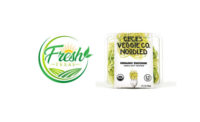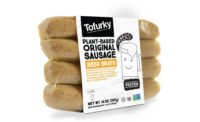Eating your veggies has never been more popular. An analysis of SPINS data by the Plant Based Foods Association (PBFA) and The Good Food Institute, showed that plant-based food dollar sales grew 6.6% in 2022 to $8 billion.
The Simple Root, a new global plant-based brand backed by venture management firm Pilot Lite and McCain Foods, the world's largest manufacturer of frozen potato products, is among the companies looking to capitalize on the growing appetite for plant-based products. The Simple Root launched plant-based dips and cheese-style spreads earlier this year and will expand its range to include plant-based cheeses this fall.
Their dips and spreads are made using a patented process to create a creamy base from root vegetables — including potatoes, sweet potatoes and parsnips – and without dairy, nuts, soy, gluten, wheat, eggs, or artificial colors, flavors or preservatives.
“Our big market is the flexitarian. They are looking to make small changes that have some positive attributes associated with the food they eat,” said David Behringer, CEO of the Simple Root and a venture leader with 25 years of experience in the food and beverage industry. “McCain has a long history of making vegetable based products. We started working with them to figure out where can you take potatoes and root vegetables. Our vision was veg-forward products because when you look at the category you see a lot of different things out there: in the next generation (of plant-based foods) – we see three spaces. The first is the traditional stuff that’s been out for a decade or so. Then you see some people working really hard on science – like fermentation-based technology, for example – and then there’s us, who are trying to pioneer this veg-forward space and give consumers something they can flip the label around and see vegetables.”
During the COVID-19 pandemic, the Simple Root developed a unique, creamy base that can be used to replicate a variety of foods in a non-dairy format, including cream cheese and dip alternatives.
“While you’re using these traditional processes, you have to understand the limits associated with using these types of new proteins so you get the taste and texture you want in your finished product,” Behringer said. “You can pick up a book on how to make cream cheese but how to make a cream cheese alternative out of a root vegetable – that took a lot of trial and error.”
While much of the production processes for plant-based alternatives is the same as their traditional counterparts, there are areas where plant-based products may require special attention.
“The plant based ground meats typically need a way to hydrate the textured vegetable protein (TVP), which requires a dissimilar hold time, but otherwise, the same equipment. Muscle simulated meats require a sub-optimized extruder to build those fibrous textures, but otherwise downstream flavoring/battering can usually take place with the same equipment,” said Jamie Valenti-Jordan, CEO of Catapult Commercialization Services, who has worked with dozens of plant-based brands to bring them to market. “Plant based yogurts and milks often require mills for breaking down nuts/seeds into a meal/butter before the milk can be extracted, but otherwise they can typically run through existing equipment. Plant based cheeses vary in nature, but they are usually formulated, not fermented, so they use equipment more similar to dough and sauce processing than cheesemaking.”
Ingredients are increasingly important, as brands seek clean label options and an ability to deliver plant-based foods, particularly proteins, which mimic the taste and texture of animal-based foods.
“You are seeing innovation further back in the supply chain at the ingredient level – let’s take something that is a common ingredient and turn it into something else very recognizable to consumers. I think that’s where the science and technology is emerging.” Behringer said.
When the PBFA started publishing data on plant-based food sales in 2018, there were only six categories to report on; today there are nearly two dozen, reflecting consumer demand for plant-based options for all meals. For example, the plant-based meat category is diversifying in line with consumer interest in a growing variety of options – from plant-based chicken types, more categories of seafood, innovation in crumbles, deli slices, meatballs and other products.
Important factors for product success, like velocity and usage, are expected to increase as more plant-based products are shelved alongside their traditional counterparts. The PBFA cites a lack of scale and subsidies and the need for expanded retail space among the challenges facing price parity but said “consistent growth and a lower inflation bubble signal the overall health of the category.”
“Dairy milk alternatives sat in the shelf stable category for a long time” Behringer said. “Most of the categories that we’re in, from a plant-based standpoint, are young. That’s one of the biggest challengers for retailers. I think one of the biggest challenges in the supply chain is being able to find the product if you’re a flexitarian shopping the store.”
Valenti-Jordan agreed.
Plant-based foods “are no longer alien,” he said. “Consumers are open to plant-based solutions in specific use cases.”



